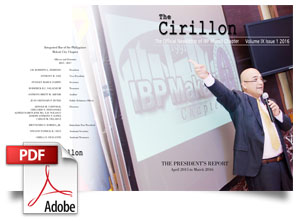Publications
Newsletter Vol VII Issue 2
RE-ELECTION CONDONATION

MIGUEL SILOS
Election time is upon us again. And, elections, being more fun in the Philippines, the fiesta atmosphere will soon pervade our collective senses. Together with the festive mood, however, election time is also the period where politicians whet their political knives and try to skewer their opponents with a barrage of administrative disqualification cases. Local government re-electionists, however, have on their side a legal doctrine that they have time and again used.
Known as the “doctrine of condonation”, it says that an elective public official who has been re-elected to his position cannot be removed administratively for acts committed during his previous term because, by re-electing the public official into office, the electorate is deemed to have condoned or forgiven his acts during the previous term. By the process of re-electing the public official, they have cleansed him of all his previous “sins” and the public official becomes immune from removal by way of administrative charges.
Should this doctrine, however, continue to be invoked or should its application be placed under scrutiny to determine its continued validity?Considering the downside of its automatic application in that an erring local public official is made immune from administrative removal, it is high time that the doctrine be re-examined.
This doctrine, including both its propositions, was introduced into our country in Pascual vs. Hon. Provincial Board of Nueva Ecija. The doctrine of condonation works on a number of assumptions and public policy considerations.
Perhaps the greatest public policy consideration, which gave rise to the doctrine, is that the people have the fundamental right to choose who their public officials will be and no entity, not even the courts, can deprive them of this right. This justification is best expressed in Pascual:
“The court should never remove a public officer for acts done prior to his present term of office. To do otherwise would be to deprive the people of their right to elect their officers. When the people have elected a man to office, it must be assumed that they did this with knowledge of his life and character, and that they disregarded or forgave his faults or misconduct, if he had been guilty of any. It is not for the court, by reason of such faults or misconduct, to practically overrule the will of the people.”
The mere assumption in Pascual that the electorate has knowledge of past misdeeds was later promoted to a conclusive presumption by the Supreme Court in Garcia vs. Mojica.
The linchpin of the theory that the electorate condones previous misconduct by their act of re-electing the public officer in question is in this sentence: “When the people have elected a man to office, it must be assumed that they did this with the knowledge of his life and character, and that they disregarded or forgave his faults or misconduct, if he had been guilty of any.” The doctrine, therefore, assumes and even conclusively presumes the electorate knew of the misconduct. But is such a leap in conclusions valid? Can it be safely presumed or even assumed that the electorate possesses such a degree of omnipotence that they know of the acts of misconduct committed by their public officers?
There are cases that point out this glaring flaw in the theory of condonation. Misconduct may easily be concealed by a public officer and such misconduct may not surface until he has been re-elected by an unknowing electorate. How then can it be presumed that the electorate knew of his misconduct when the same was hidden from them? This flaw was put to the fore by the Supreme Court of Kansas in State of Shroeder, wherein defendant interposed the defense of condonation after he was re-elected. The Court, in denying his argument, said:
“Condonation of an offense implies knowledge of the offense, and, if the officer's misconduct in the prior term was concealed or not known to the electorate or the appointing official at the time of the re-election or reappointment, several courts have refused to apply the rule.
We would have difficulty supposing any electorate would knowingly re-elect as guardian of the public funds one guilty of the deceitful dealings involved here... The wrongdoing has been concealed from public view and there is nothing before us which may fairly be interpreted as condonation by the electorate.”
Other cases have, likewise, recognized the stark reality that misconduct can be easily hidden from the electorate or the appointing authority and therefore debunked the theory of the electorate condoning previous offenses.
The fact that there is a big possibility of the electorate's being unaware of the public official's misconduct is too important to be ignored by courts in our jurisdiction. It is a fact that adheres to common sense and reality. Misconduct can be easily hidden from the public; and even if the misconduct comes to light, these facts may be learned only after the guilty officer has been unwittingly re-elected.
The conclusive presumption fashioned by the Court in Garcia regarding the knowledge of the electorate must not, therefore, be given attribution as a Gordian-knot solution. The ordinary man in the street is not expected to keep abreast of administrative cases pending against a public official and the facts surrounding it. Hence, instead of a conclusive presumption, the Court should require as a threshold evidentiary fact that there was some degree of disclosure of such facts to the electorate in general such that they know or should have known that the person they were re-electing into office committed or could have committed acts which breached the trust reposed upon him. This would not be too difficult since newspaper articles or news reports on such cases can be proven by simple evidentiary means and need not be as impossible as the Court in Garcia made it appear. Reprinted with permission by the Author. This article was previously published in the Business Mirror on 4 October 2012.
View Newsletter
Mr. Silos is a partner in the Litigation Department at CVC Law, Villaraza Cruz Marcelo & Angangco. He earned his Juris Doctor degree with honors from the Ateneo Manila University School of Law and holds a Master of Laws degree from Georgetown University.

